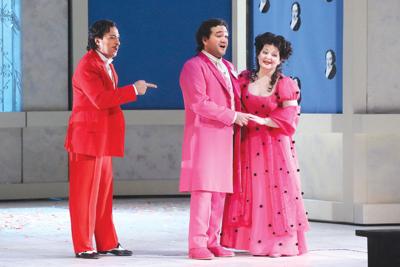DOWNTOWN LOS ANGELES - As legend has it, the debut of Gioachino Rossini’s The Barber of Seville in 1816 wasn’t just a dud, but a disaster.
The crowd at the Teatro Argentina in Rome jeered and yelled at the performers. Much of the outburst came from supporters of rival composer Giovanni Paisiello, who had already written an opera based on the play by Pierre Beaumarchais.
Fast-forward about 200 years and Rossini’s Barber stands at the peak of the comic opera repertoire. Its easy humor and score, rife with recognizable compositions, resonates with audiences. No wonder it’s one of the most performed operas around the world.
Many laughs rang out in the Dorothy Chandler Pavilion during the opening-night performance of Barber, no surprise considering the tongue-in-cheek, slapsticky libretto by Cesare Sterbini. The lilting arias and vocal acrobatics from the leads drew warm, extended applause. Conductor James Conlon’s lyrical and balanced leading of the orchestra was, as usual, impeccable.
So why does L.A. Opera’s revival of a 2009 production feel a bit... flat? Its most energetic conflicts sometimes look listless. Its most intimate moments lack a sense of closeness. Its stars sometimes don’t appear to have any focused physical act in mind.
Part of the problem is director Trevore Ross’ often static staging that gives performers little to do. More coherent and striking movement could heighten the tension and deliver a sharper, more physical comic edge.
This isn’t to say Barber lacks visual appeal. The opera, which has four more performances through March 22, opens in dramatic fashion, with just a big yellow moon hanging over a dark horizon. Piece by piece, the set rolls in to form a beautiful Italian street, colored in austere black, silver and white tones. Soon comes the first sight gag: The protagonist, Count Almaviva, pops out of the top of a tiny carriage held by two servants before launching into song.
Barber follows the wealthy Almaviva (René Barbera), who is in love with the beautiful Rosina (Elizabeth DeShong). He woos her using an alter ego, Lindoro, to confirm that she’s falling for him, not his riches. However, Rosina is guarded by the jealous Doctor Bartolo (Alessandro Corbelli), who wants to marry her himself.
Things look hopeless until the arrival of Almaviva’s former servant, Figaro, who suggests the count disguise himself as a drunk soldier assigned to stay in Bartolo’s home, just to get in contact with Rosina.
The set soon transitions into the grand mansion, which looks like the scene of a sleek Vogue photo shoot, complete with a lanky silver tree. It’s the site of one big highlight, the “La calunnia” aria of Don Basilio (Kristinn Sigmundsson), in which he suggests that Bartolo should slander Almaviva to cut his courtship short. The imagery of a sheet billowing out into an ever-growing cloud around Basilio as he sings is wickedly effective.
This Barber could use a few more similar touches. The production, originally from Teatro Real Madrid, has a gorgeous design, but one that leaves a lot of room for the players to use. They often don’t do it well — Ross has many scenes in which people pace the floor without much focus, including in duets. Figaro and Almaviva may be singing “Such an exquisitely clever plan!” together, but there’s no sense of conspiratorial deviousness in their motions.
There is a sizeable chorus, but its members are only rarely effectively deployed, such as in the finale of the first act. Even then, when a massive police squad confronts Almaviva (in his drunk soldier garb), there’s a lack of choreography that adds energy to what should be a tense scene. Why have the guards standing in neat lines in the background?
Despite these shortcomings, Barber has some standout performances, in particular mezzo-soprano DeShong, who handles Rosina’s songs with grace and virtuosity. Barbera, meanwhile, shows off why he won Plácido Domingo’s Operalia competition in 2011; his punchy tenor and easy top notes sound crisp and full. Russian baritone Rodion Pogossov could give Figaro a bit more physical swagger, but he displays great vocal agility and a lyrical flair.
Also strong are Corbelli, a veteran Rossini singer, as Bartolo, and Sigmundsson, whose thundering bass gives a sense of weight and danger to Basilio. There’s much to like in the pit, especially with Conlon keeping the score grounded and sensitive with a few smart pushes of tempo that add a flourish to big moments.
No doubt fans of Rossini will have little to complain about after seeing this show, and the literally colorful finale is a nice, if mildly confusing, finish. Comic brilliance, however, has as much to do with the subtleties of body language and movement as it does speech, and Barber winds up a bit short.
The Barber of Seville runs through March 22 at the Dorothy Chandler Pavilion, 135 N. Grand Ave., (213) 972-7219 or laopera.org.
© Los Angeles Downtown News 2015

